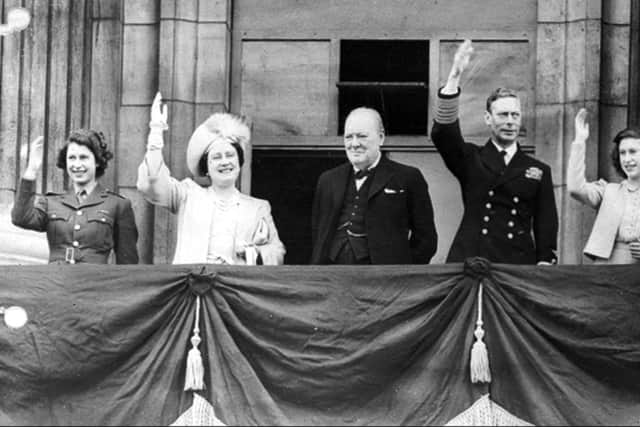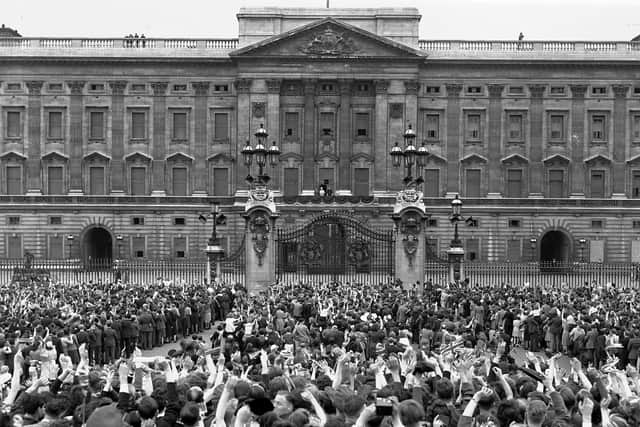How King’s VE-Day speech set Royal tone that endures today
“Today we give thanks to Almighty God for a great deliverance,” he said. “At this hour, when the dreadful shadow of war has passed from our hearths and homes in these islands, we may at last make one pause for thanksgiving and then turn our thoughts to the tasks all over the world which peace in Europe brings with it.”
Relayed throughout the empire and repeated for the benefit of the newsreel cameras, his words captured perfectly the values for which the nation had been fighting.
Advertisement
Hide AdAdvertisement
Hide AdThey have lost little of their resonance in the three-quarters of a century that has passed, and they are likely to be heard once more when the Queen makes her own anniversary address this evening. She will begin speaking at 9pm, just as her father had done.


The contribution she and he had made to the war effort helped cement the Royal Family at the centre of the nation, a position that has not been seriously challenged to this day.
By war’s end, the King was, as Churchill put it, “more beloved by all classes and conditions” than any prince in history.
“The great contribution of the Royal family was to stay in the country right through the war. They inspired a sense of mission,” said the historian and author Professor Brendan Evans, of Huddersfield University.
Advertisement
Hide AdAdvertisement
Hide Ad“It wasn’t so much what the King said that mattered but the fact that he was here to say it. As a national leader and communicator he wasn’t as effective as Queen Elizabeth has turned out to be, but his presence stood as a symbol of what everyone believed was important.”


He had seen service as a junior naval officer at the battle of Jutland during the First World War, but his importance in the second conflict was seen as being on the home front. With the Queen, he toured the bomb sites of London, Bath and Manchester, and survived air raids on Buckingham Palace itself.
“It does affect me, seeing this terrible and senseless destruction – I think that really I mind it much more than being bombed myself,” the Queen wrote.
She was speaking from experience. In September 1940, a week into the London blitz, two bombs fell in the Palace’s inner quadrangle, a few yards from where she and the King had been taking tea. A third destroyed the chapel and two more left craters in front of the building.
Advertisement
Hide AdAdvertisement
Hide Ad“I am glad we have been bombed. It makes me feel I can look the East End in the face,” the Queen famously said.
But her daughters, the princesses Margaret and Elizabeth, would “not leave unless I do”, she insisted. What was more, she went on, “I shall not leave unless their father does, and the King will not leave the country in any circumstances whatever”.
The Government seized upon the capacity of their loyalty to boost morale. Cameras were allowed inside the damaged Palace to demonstrate that they shared the same privations as everyone else.
And when the Royal family was issued with ration books and clothing coupons, the details were allowed to be reported – although the fact that the Queen received 1,277 coupons and not the standard 66, was less well known.
Advertisement
Hide AdAdvertisement
Hide AdThe princesses also joined in the national effort, with the young Elizabeth making her first public speech in October 1940, in a radio address to the children of the Commonwealth – many of them evacuees. Margaret joined in at the end.
“When peace comes, remember it will be for us, the children of today, to make the world of tomorrow a better and happier place,” the future Queen said.
The evacuation exercise in 1939 had been a saltatory experience, not only for the city families who had been separated but also for those in the countryside who found themselves caring for strangers, Prof Evans said.
“Many children were evacuated to middle class, rural, respectable families who found their poverty and their low dependence on hygiene extremely striking. Comfortable parts of Britain had a rude awakening to the extent of the deprivation. Evacuation really brought it home,” he said.
Advertisement
Hide AdAdvertisement
Hide AdBut the Royals never fell into the trap of becoming victims of the ensuing demands for social change. Instead, they adopted the policy of political neutrality they have maintained to this day, Prof Evans added.
“They have always managed to remain above the political debate. It has sometimes meant they’ve been criticised, when it seemed they were endorsing whatever the Government did, but on the whole they have united rather than divided the country.”
Unity was the national asset to which the King returned most often in his VE-Day speech, as he summed up the shared experience that had touched royal and commoner alike.
“The Queen and I know the ordeals which you have endured throughout the Commonwealth and Empire,” he said. “We are proud to have shared some of these ordeals with you and we know also that we together shall all face the future with stern resolve and prove that our reserves of willpower and vitality are inexhaustible.”
Advertisement
Hide AdAdvertisement
Hide AdHe also alluded to what had been at stake, in Britain and around the world.
“In the darkest hours we knew that the enslaved and isolated peoples of Europe looked to us, their hopes were our hopes, their confidence confirmed our faith. We knew that, if we failed, the last remaining barrier against a worldwide tyranny would have fallen in ruins,” the King said.
“But we did not fail. We kept faith with ourselves and with one another, we kept faith and unity with our great allies. That faith, that unity have carried us to victory through dangers which at times seemed overwhelming.”
Although he spoke for everyone, it had not always been taken for granted that anyone would want to listen.
Advertisement
Hide AdAdvertisement
Hide AdWith the abdication crisis only three years behind them at the start of the war, the Royals had been forced to build bridges, and ironically it was the King’s brother, the disgraced and deposed Edward VIII, from whom they inherited their signature gesture of turning out to stricken areas.
As Prince of Wales, Edward had controversially toured distressed mining towns and declared himself appalled. “Something must be done,” he said. It was a side to his character that endeared him to Churchill but not to most of the rest of the political establishment.
Edward’s later political leanings, and Hitler’s courting of him, remained a secret to the British people until much later. Churchill, meanwhile, forgave the King for having supported Neville Chamberlain’s policy of appeasing the Nazis – and favouring the appointment of Lord Halifax as his successor.
Editor’s note: first and foremost - and rarely have I written down these words with more sincerity - I hope this finds you well.
Advertisement
Hide AdAdvertisement
Hide AdAlmost certainly you are here because you value the quality and the integrity of the journalism produced by The Yorkshire Post’s journalists - almost all of which live alongside you in Yorkshire, spending the wages they earn with Yorkshire businesses - who last year took this title to the industry watchdog’s Most Trusted Newspaper in Britain accolade.
And that is why I must make an urgent request of you: as advertising revenue declines, your support becomes evermore crucial to the maintenance of the journalistic standards expected of The Yorkshire Post. If you can, safely, please buy a paper or take up a subscription. We want to continue to make you proud of Yorkshire’s National Newspaper but we are going to need your help.
Postal subscription copies can be ordered by calling 0330 4030066 or by emailing [email protected]. Vouchers, to be exchanged at retail sales outlets - our newsagents need you, too - can be subscribed to by contacting subscriptions on 0330 1235950 or by visiting www.localsubsplus.co.uk where you should select The Yorkshire Post from the list of titles available.
If you want to help right now, download our tablet app from the App / Play Stores. Every contribution you make helps to provide this county with the best regional journalism in the country.
Sincerely. Thank you.
James Mitchinson, Editor
Comment Guidelines
National World encourages reader discussion on our stories. User feedback, insights and back-and-forth exchanges add a rich layer of context to reporting. Please review our Community Guidelines before commenting.